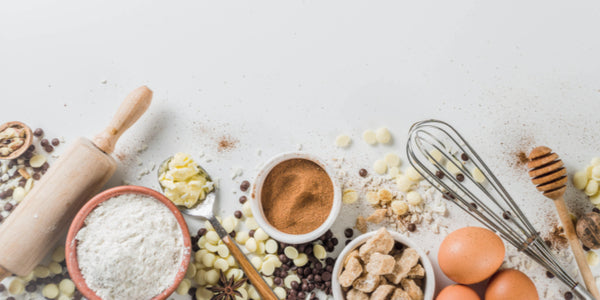
Spend an abundance of time on the baking process only to have fresh products go bad? Wish for a solution to increase shelf life of bread (and other delicious baked products) and reduce food waste?
Then look no further, bakers!
Read on to learn how to prevent mold growth, give baked bread a longer shelf life, and more!
4 Ways to Extend Shelf Life of Baked Goods
Naturally extend the shelf life of baked goods with these 4 tips and tricks, including the use of a friendly freezer and unique ingredients.
1. Know the Freezer is Your Friend
Freezing has been used in cold climates for centuries as a natural way to preserve food and extend shelf life.
So if finding that baked goods are spoiling sooner than enjoyed, consider putting baked goods in a sealed container in the freezer. This works for baked products like unfrosted cookies, brownies, muffins, and most breads.
Freezing should not negatively impact taste or texture as long as air exposure is limited, so store baked goods in airtight containers, wrapped tightly in foil, or a sealed plastic bag. But before transferring to the freezer, make sure baked goods are completely cool.
Likewise, freeze cookie dough in an airtight container. Only use enough dough for what is needed immediately and keep the rest in the freezer. Simply pull the dough out when wanting to make more cookies.
Fridge with Caution
While the freezer is your friend, Martha Stewart suggests using caution for putting baked goods in the refrigerator. Putting baked goods, especially tender baked goods like certain breads, cakes, muffins, cupcakes, can negatively affect taste and texture.
The exception is baked goods that are cream-based or have raw dairy or eggs. These need to be refrigerated to prevent foodborne illness.
2. Seal Food Correctly
Sealing food correctly, whether in the freezer, refrigerator or on the counter, is the simplest way to extend the shelf life of bakery products according to Luminary Bakery.
While a beautiful, open-air stack of cookies may look nice on the counter, this will not help the cookies taste good. Instead of leaving baked goods out in the open air, store in an airtight container, bag, or jar.
Vacuum Seal Baked Goods
Oxygen in the air is a main culprit for making food go bad or stale. Therefore, eliminating this exposure with vacuum sealing can greatly extend shelf-life.
While often thought of for large commercial food packaging, personal food vacuum sealers are now readily available and more common to find.
If a frequent baker or have limited freezer space, using a vacuum sealer may be worth checking into.
Use Oxygen Absorber Packets or CO2 Pads
Take enhancing shelf life a step further by using a sealed container and adding in an oxygen absorbing packet or a CO2 pad. Both work to help eliminate oxygen surrounding the baked goods, which is helpful because oxygen dries out baked goods out and promotes microbial growth.
CO2 pads are considered chemical-free, and oxygen absorber packets are used widely in many commercially packed foods. Both options are also available for individual usage.
3. Preserve with Common Ingredients
Common ingredients, including bread and honey, are not just for enjoying. Using the two, along with other staple items, can help extend the shelf life of bakery products.
Add a Piece of Bread to the Container
Adding a piece of bread to an airtight container can help extend the shelf life for soft cookies. Crispy cookies, like ginger snaps, will not need the extra addition to the container.
The piece of bread prevents moisture loss from baked goods so they can sit out on the counter longer while tasting fresh. She Knows suggests using a quarter piece of bread per dozen cookies and white bread to limit altering the flavor of the cookies.
Preserve with Honey or Golden Raisins
Both honey and golden raisins can act as a natural preservative in baked goods while offering natural sweetness. This means one can cut down on the amount of other sweeteners, like sugar, to add to baked goods when having these in baked goods.
Cookies with raisins typically last about two weeks at room temperature without getting stale or moldy. Golden raisins have an advantage over darker raisins for preserving baked goods because of the sulfur dioxide that is added to them when dried. Therefore, they add the most preserving benefit to baked goods.
Some baked good recipes use only honey for a sweetener. However, subbing about 20 percent of sugar for honey in other baked good recipes can have a positive effect on improving shelf life.
While experimenting with subbing or adding raisins or honey, taste-test the dough and adjust as needed. Total raisin weight should not make up more than one-tenth of flour weight.
Use Salted Butter
Consider using salted butter in place of unsalted butter to extend shelf life if not wanting to mess with a timeless recipe by adding raisins or switching in honey. Switching from unsalted to salted butter may be the subtlest way to help baked goods last longer without altering the flavor.
Salt is one of the oldest preservatives in the culinary books. Switching to salted butter takes advantage of salt's natural preserving properties without overtly altering the taste or texture of baked goods.
4. Consider an Emulsifier or a Natural Preservative
Emulsifiers in baked goods help with batter stabilization, batter aeration, strengthening dough, and improving shelf extension.
Commercial baked goods often have added emulsifiers and preservatives that work to prevent mold and improve shelf life. However, some of these ingredients can be synthetic and more complicated to work with.
While it may take some extra research and experimenting, homemakers can use natural preservatives and emulsifiers. These include pectin, egg yolks, and lecithin.
Pectin is naturally found in fruit and is used in jellies and jams to provide gel-like consistency. Lumina Bakery suggests adding a tablespoon or two of pectin to breads can help extend shelf life. Egg yolks and lecithin (usually from soy or sunflower oil) are common, natural emulsifiers.
Reference:
10 Ways To Prolong The Shelf Life Of Cookies. James & James, 2020. https://survivalfreedom.com/10-ways-to-prolong-the-shelf-life-of-cookies/.







